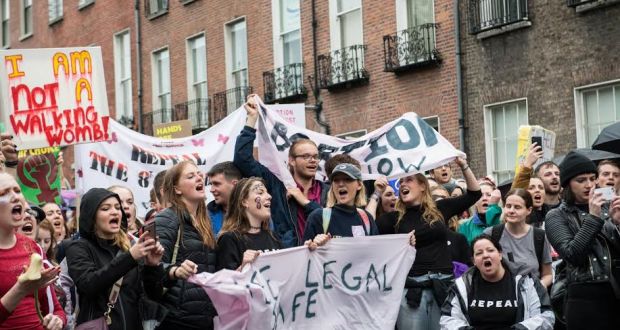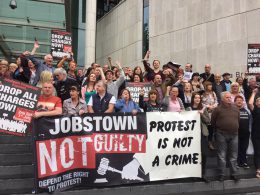By Katia Hancke
The debate on abortion rights has moved on dramatically over the last five years. Just look at the discussions taking place even in as conservative an environment as the Oireachtas Committee on the 8th Amendment, dominated as it is by the anti-choice and right wing parties of the capitalist establishment. Witness after expert witness has outlined to politicians that not only is the 8th unworkable, anything less than abortion up to 12 weeks on request would make a mockery of the reality of the situation.
Opinion polls systematically indicate that the huge majority in this country supports a repeal of the 8th Amendment and a significant widening of abortion access. This is most pronounced among young people and women. But it is also filtering into the workers’ movement as a whole. Unite have long held a full pro-choice position, but now more and more other unions are becoming pro-Repeal as young (mainly) female workers such as creche workers and SNAs are getting organised and are reflecting the mood for change in their unions. For now, that change has not led to the trade unions taking their rightful place as an integral part of the growing movement for abortion rights, but if the influx of women workers into the trade unions can wake this sleeping giant, it would be a powerful string to our bow – linking the traditional organised working class with the new social movement.
The role of socialist feminists
Rosa activists and Socialist Party members have played a crucial role in moving this debate on from the very limited thinking of X-case legislation or legislation on limited health grounds to where we are today. The huge outpouring of anger after Savita’s death indicated that attitudes had fundamentally changed for the better. Yet many in the established pro-choice movement clung to the idea that lobbying for X-case legislation was the most “reasonable” approach. In contrast, Rosa and the Socialist Party based itself on what was necessary; popularising the need for Repeal of the 8th amendment. As socialist feminists we recognised that only a struggle from below could force the establishment to act and that unless we demand what we need in the strongest way possible, odious compromises will be made.
The Irish establishment has a long history of trading women’s lives for political gain. We did get X-case legislation under the Fine Gael /Labour government, but it ended up being a step backwards rather than forwards –abortion was still not available, as graphically proven by the case of the young woman being sectioned for asking for an abortion. Worse, women were criminalised for having an abortion with penalties of up to 14 years in jail! The mass movement for Repeal on the other hand has brought us to where we are today – it has become the rallying cry of a movement that is no longer afraid to boldly demand bodily autonomy.
The actions organised by ROSA and Socialist Party member Ruth Coppinger TD, in conjunction with womenonweb.org, highlighting medical abortion and the increasing use of safe but illegal abortion pills exposed what was really needed – to trust women and the decisions they make over their own bodies – rather than allowing the debate to be hemmed in by the conservative voices of the past debating which woman is “worthy” of a legal abortion.
The abortion pill train three years ago, follow by two tours of the country with abortion pill buses, were a conscious intervention by socialist feminists to assist women in a practical way to gain access to safe and affordable abortion. As importantly, they were designed to consciously flout the law and prove that the status quo was (and is) unworkable. They moved medical abortion from the private – individual women resorting to criminalised abortions in their own home – to the political – abortion rights activists standing up and saying “this is the reality of what women do and need and we no longer accept it being swept under the carpet”.
Today, at least five women every day use abortion pills on this island, a reality that has transformed the current debate around abortion rights legislation. Does that mean the backwards, conservative establishment will be forced to acknowledge that reality? Only if we continue to exercise ever-increasing pressure on them through further actions and mobilisations, but the very fact that the debate has moved so far is a tribute to radical, non-conformist tactics that place the needs of (especially the most oppressed) women and pregnant people before the need to be “reasonable”.
The fact that those daring actions were able to happen without prosecutions is because they based themselves on the radicalisation of a wide layer of women and young people who are fed up with the conservative status quo. The now ubiquitous message of “repeal” on badges, jumpers, bags etc. was always understood by this new generation as a rallying cry for bodily autonomy, nothing less. The fight for abortion rights is a concrete expression of a wider awareness and anger with the oppression meted out to us under this system – the commodification of women’s bodies and sexuality on the one hand, the grasp of an out of touch establishment, which allows church control of education and hospitals, on the other hand.
International radicalisation
This radicalisation is reflected right around the world in an emergence of a new women’s movement – from Latin America’s mass mobilisations fighting violence against women, to Poland’s black movement fighting attacks on abortion rights, to courageous protests in India against rape culture, and many, many more. The international solidarity with the Women’s Marches in the US last January highlighted just how much a global consciousness is an integral part of this radicalisation.
Within this global movement, Ireland’s struggle stands out in one respect – rather than having to defend what our mothers (and grandmothers) fought for, we are fighting for something we never had. And with an offensive struggle the question of exactly what we are fighting for comes to the fore much more prominently. The question of developing a programme that inspires a new generation moving into struggle is posed prominently and explains why the current struggle has such a politicising effect on wide groups of women and young people.
Seeing our fellow activists in other countries losing gains made 40 years ago highlights that under this system no gains can ever be taken for granted. Under capitalism there is a relentless push to wipe out any advances that oppressed groups and working-class people have won. Working conditions won by radical trade union action of the past are undermined by zero hour contracts and precarious work; equally so any social gains such as abortion rights, advances in civil rights, women’s and LGBTQ equality are constantly under threat. Seeing this happen internationally creates an openness to debate what we need to do to ensure our fight for a more equal world will not be eroded within years. That discussion points to a broader analysis of the nature of the capitalist system.
Personal freedom and capitalism
The growing openness to socialist feminist ideas is not just because it offers a wider explanation of the radical tactics needed, but because it also offers an understanding of the roots of women’s oppression. At the heart of the struggle for bodily autonomy is the struggle for genuine personal freedom. Socialist feminists understand the importance of personal freedom and of self-emancipation of the working class and oppressed – the liberating effect of standing up with others for your rights, realising that oppression is not a personal problem you just have to accept but a consequence of a capitalist system based on division and exploitation.
Capitalism offers us a constant stream of propaganda that personal “freedom” has been achieved – an abstract idea that social, gender and sexual liberation is possible. Concretely though, that “freedom” means two very different things depending on which side of the divide you are on.
If you are part of the 1%, the rich, (predominantly) white, male capitalist class who dominate the global system economically as well as ideologically, you can buy all the personal “freedom” you want. You can celebrate the late Hugh Hefner, of Playboy fame, as a “sexual liberator” who made his fortune on the commodification of women’s bodies. You can fete the selling of women’s bodies for buyers’ pleasure as liberation. You can defend the sexual assaults of Weinstein as an aberration in an industry glorifying unrealistic models of femininity and masculinity – and you better make sure that you fit into one of those boxes. You can even try and claim that those Barbie representations of what women should look like are something which to aspire, a goal worthy of great effort. In short, freedom itself is commodified – rather than reflecting a liberation from want and obligation to allow for people’s personal fulfilment, it has become something you can buy. Freedom for the 1% comes at the cost of exploitation of the 99%.
For the rest of us, freedom under capitalism looks more like “just another word for nothing left to lose”. Our bodies and sexuality are commodified, commercial sex has become ubiquitous, we are told to treat our appearance as an “asset” and to see sexism as “ironic fun” that should not be called out. Ours is a capitalist free society, where people have to take to social media divulging their personal stories to highlight that sexual assault is commonplace; where sex education is so out of step with teenage behaviour that it provides young people with no framework to discuss the messy reality of exploring sexuality and sexual relationships; where there is still a taboo about contraception, which is hard to get and expensive; where non-binary and LGBTQ people are forced to go through an extremely gendered education system and are still marginalised.
Neo-liberal capitalism
The contradictions don’t stop there: mothers should work but childcare is the equivalent of a second mortgage; young people should educate themselves (we have the best educated generation ever) only to end up overqualified in dead end precarious jobs; social and affordable housing is stigmatised as something from the past but over 500,000 young adults live with their parents because they cannot afford to move out.
When Thatcher 40 years ago started heralding the family as the corner stone of society, she did it for a reason: a thin ideological veneer to justify cutting community and social services and shift the burden of looking after the more vulnerable in our society back to the individual family unit. That neo-liberal offensive right across the world has done untold damage in tearing apart communities, privatising childcare and care for the sick and elderly etc. Public services are starved of funds and privatised, placing an ever greater burden of social care on the individual.
This is the best “freedom” this system has on offer. This reality disproportionately affects the most vulnerable – people of colour, single parents, people living in poverty, the LGBTQ community, women trapped in abusive relationships. That concrete reality has been illustrated by the horror stories covered by the media in recent years. The young refugee rape victim denied an abortion; the teenager sectioned for asking for an abortion; the high numbers of LGBTQ people who find themselves homeless; the huge growth in mental health problems. If we want to achieve real personal freedom for all, our struggle has to have an anti-capitalist and socialist outlook.
Freedom and socialism
Personal freedom for socialists means to create the means under which people are supported to find the space and confidence to express who they really are, free from labels. That starts with freedom from economic exploitation. This world is richer than ever before, but the wealth has never been so concentrated in the hands of so few. The means are there to provide security for all – a home, a stable job, a living wage – but it requires taking ownership of the means of production so resources can be used to build homes for people rather than for speculators, to employ people productively rather than for exploitation.
Economic security provides the basis upon which we collectively could decide to invest in treating those most vulnerable with the respect every human deserves – free quality public childcare, integrated care for the elderly, a national health service freely accessible to all.
But it goes much further than that. Personal freedom means liberation from gender stereotypes, the right to express your sexuality and gender in whatever way you feel fit. It means sexual liberation in the real sense of the word – being free to have consensual sex with the person you want to have sex with or none at all. To express yourself freely, to let human creativity flourish for the good of society as opposed to being commercialised.
A socialist society would be a society not based on discrimination, be it economic, social, racial, gender-based, sexual. Genuine collective decision making and control over the main forces and resources that provide security and stability in our lives allows us the freedom to have control over our own lives. When the running of society is no longer based on exploitation but on “from each according to their ability, for each according to their needs”, you create the basis for a more humane, caring society. It fundamentally challenges existing power relationships – not just in the public sphere but also in the personal sphere. It creates the basis for real fulfilment in terms of your contribution to society, the potential to be part of a collective striving for a society based on need not greed.
Human liberation and socialist change
It also creates the basis to find personal fulfilment in creating the space for people to express who they are, free from stereotypes and pressure to conform. This type of human liberation and personal freedom is something worth fighting for. But it involves linking our immediate struggle for abortion rights and women’s liberation with a broader struggle against the capitalist system. To take on the power of the elite, of the capitalist class, in whose interest it is to keep the status quo.
The advantage of a clear sighted analysis of what is stopping us from achieving the type of liberation we all deserve and are capable of is that it points to common struggle. There is no doubt that different social groups suffer oppression in different and overlapping ways and any common struggle has to be sensitive to this, respectful and inclusive.
The power of common struggle has to be that it allows all of us to fight for our own self-emancipation together. We need to use those diverse experiences to unite us, not to divide us. The common cause that unites all oppressed groups and the working class as a whole is the fight against a capitalist system that holds us back from realising our potential – personally and as a society. United we can challenge the thwarted logic of this system of ever increasing inequality, but it requires us getting organised around a programme that not just fights for the rights of all our different voices, but challenges the system as a whole and provides a vision of a socialist alternative.n












